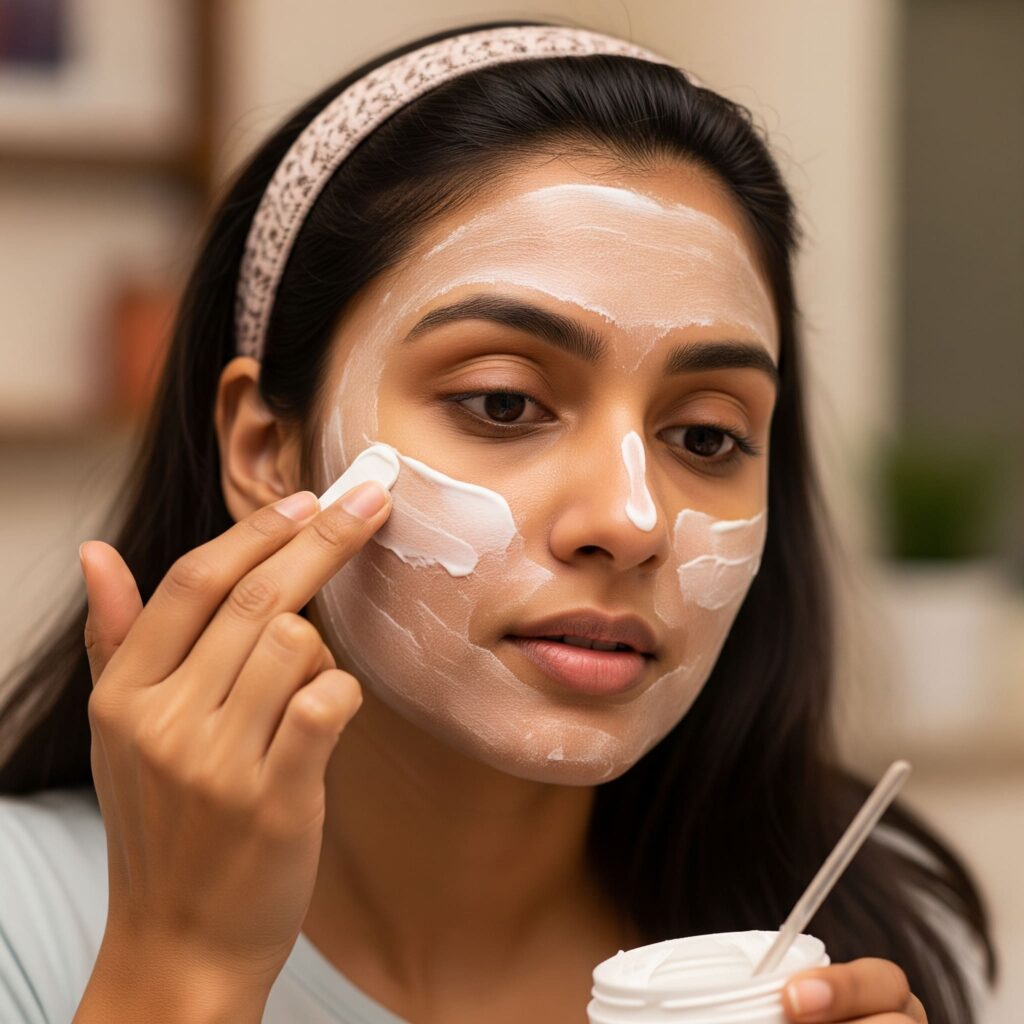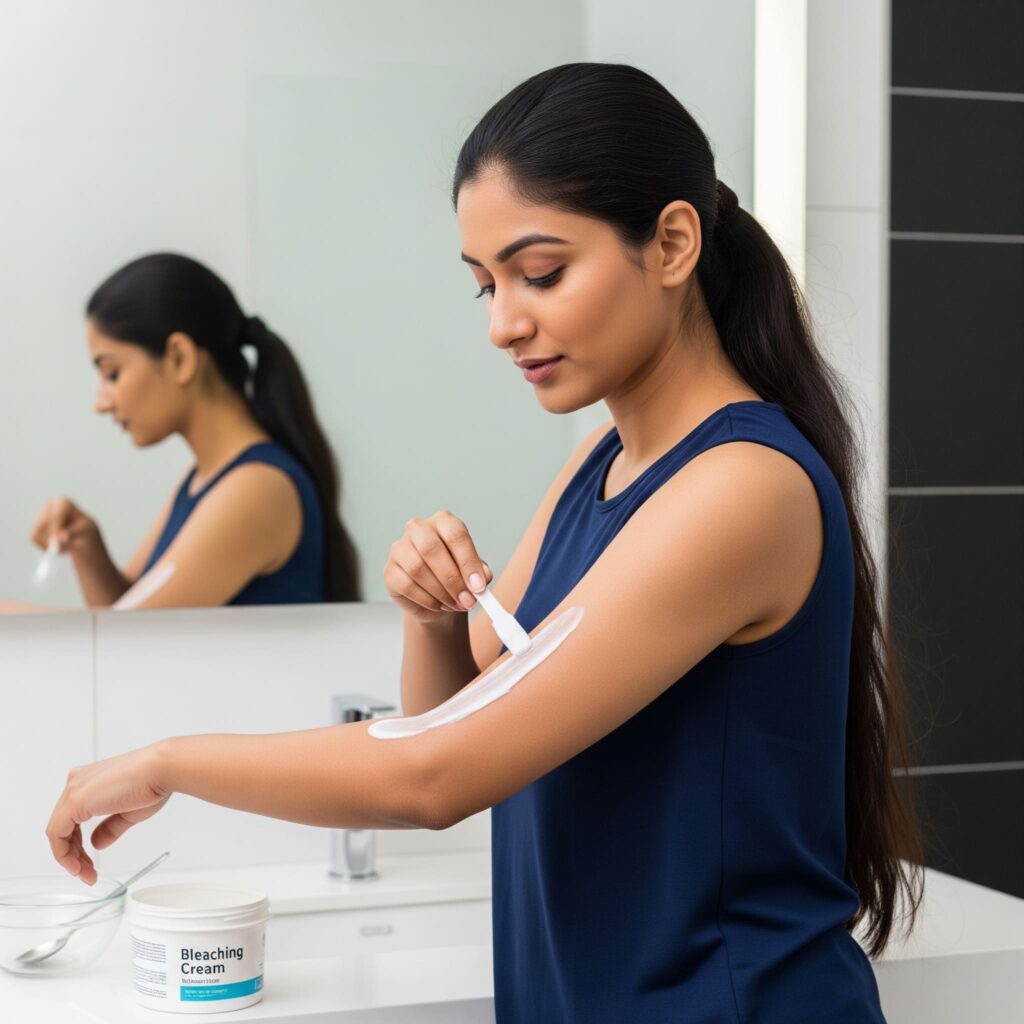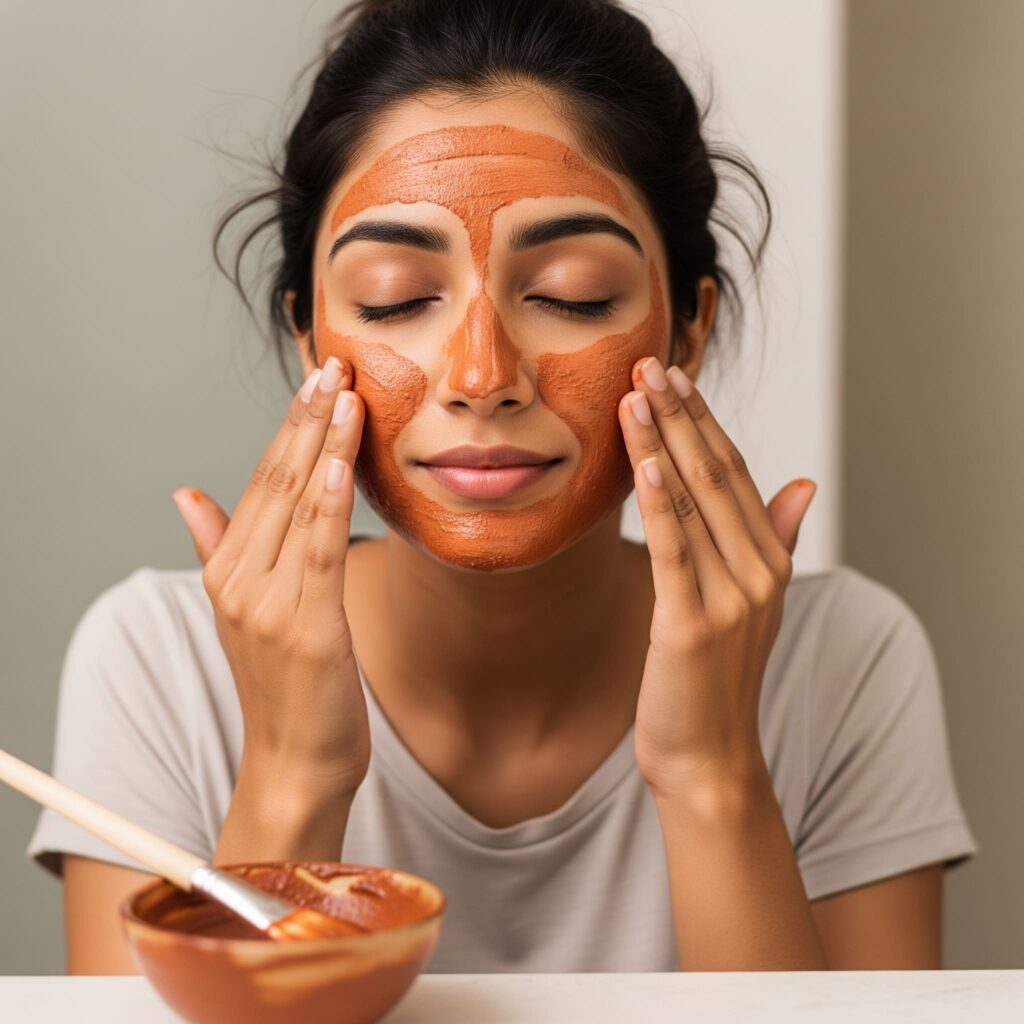Bleach and detan are both skin treatments, but they differ in their purpose and methods. Bleach primarily lightens the skin tone by reducing melanin production, while a de-tan treatment focuses on removing tan and dead skin cells to reveal a brighter, natural complexion. De-tan is generally considered a gentler and safer option for tan removal, especially for sensitive skin, while bleach can be more harsh.
When striving for radiant and even-toned skin, the bleach vs detan debate often comes up. Understanding bleach vs detan is essential because both promise to brighten skin and reduce tanning but work differently with unique benefits. So, when comparing bleach vs detan, you might ask, “Does bleach damage skin?” or “Is cream bleach vs detan better for my skin type?” This guide explores these questions to help you choose the best treatment tailored to your skin’s needs.
Table of Contents
What is Bleach?
Bleach is a cosmetic treatment that lightens the color of the skin by breaking down melanin, the pigment responsible for skin tone. In the context of bleach vs detan, bleach works by chemically lightening the existing melanin, creating a brighter, lighter appearance. Unlike detan treatments that focus on removing sun tan and dead skin cells, bleach targets pigmentation and dark spots at a deeper level.

When considering bleach vs detan, it’s important to note that bleach involves a mixture of bleaching agents and oxidizing chemicals that reduce melanin concentration. Therefore, in the ongoing debate of bleach vs detan, bleach is primarily used for achieving lighter skin tone rather than just removing tan, offering a distinct cosmetic effect. Bleach products often come in creams or powders, mixed with activators either at salons or for home use.
Pros of Bleach
When considering facial treatments, the debate between bleach vs detan is common among skincare enthusiasts. Bleach offers the advantage of effectively lightening the skin tone by reducing melanin, making it a popular choice for people aiming for a brighter complexion. Unlike detan treatments that focus on removing tan and dead skin cells, bleach deeply penetrates to lighten pigmentation and dark spots. However, in the bleach vs detan discussion, bleach is often preferred for its faster results and ability to even out skin discoloration. While bleach can be more potent, it is essential to use it carefully to avoid irritation.
- Provides quick lightening of skin tone and dark spots
- Helps reduce visible hyperpigmentation and patches
- Creates an even complexion by evening out melanin concentrations
- Can increase radiance and give a glowing appearance
- Often used before makeup application to create a uniform base
Cons of Bleach
When comparing bleach vs detan, it is important to note that bleach can be harsher on the skin and may cause irritation or dryness, especially for sensitive skin types. Unlike detan treatments that gently exfoliate and rejuvenate the skin, bleach uses strong chemicals that may strip away natural oils, leading to redness and discomfort. Additionally, bleach vs detan treatments differ in their long-term effects, where bleach might lighten the skin temporarily but can weaken skin health over time, while detan promotes overall skin care. Therefore, understanding the cons of bleach in the bleach vs detan debate is essential for choosing a safer and more skin-friendly option.
- Contains harsh chemicals that can irritate or damage skin
- Can cause dryness, redness, and sensitivity with frequent use
- May lead to uneven or unnatural lightening if not applied properly
- Not recommended for very sensitive or acne-prone skin
- Requires careful aftercare, especially sun protection, to avoid further damage

How to Apply Bleach on Face Step by Step
When deciding between bleach vs detan treatments, it’s important to know how each affects your skin. Bleach vs detan differs mainly in their approach-bleach lightens your skin tone, while detan removes dead skin cells and tan. Many people wonder which is better, bleach vs detan, but the answer depends on your skin type and desired results. Understanding bleach vs detan will help you choose the safest and most effective treatment for a glowing complexion.
Step 1 : Patch test : Always test on a small skin area 24 hours before full application.
Step 2 : Cleanse skin : Remove dirt, oil, and makeup thoroughly.
Step 3 : Mix bleach cream and activator as per instructions.
Step 4 : Apply evenly on the face avoiding eyes and lips.
Step 5 : Leave for 15-20 minutes or as recommended but don’t exceed time to avoid irritation.
Step 6 : Rinse off thoroughly with lukewarm water.
Step 7 : Follow up with moisturizer and apply sunscreen during the day.
Does Detan Remove Tan?
Yes, Detan treatments primarily focus on removing sun tan. In the bleach vs detan debate, detan commonly involves exfoliating products or facials that remove dead skin cells containing excess melanin. The process gently lifts the tan from the outermost skin layers without aggressive bleaching. In contrast, bleach works by lightening the skin more aggressively, which can sometimes irritate sensitive skin.
Detan products often contain natural ingredients like fruit enzymes, antioxidants, and soothing extracts, which help brighten the skin gradually while nourishing and promoting cell renewal. When comparing bleach vs detan, detan is considered gentler and more nourishing due to its natural components, making it suitable for most skin types seeking gradual brightening without harsh effects.
Thus, understanding bleach vs detan helps you choose a treatment that fits your skin’s sensitivity and desired results-detan for gentle tan removal and skin health, and bleach for more immediate, stronger lightening effects. Discover the key differences between contour and bronzer in this blog!
What is Detan ?
Detan treatment is a skincare procedure aimed at reversing sun tan and dullness by exfoliating dead skin cells and restoring brightness. When comparing bleach vs detan, it’s important to note that detan uses mild, natural ingredients that promote skin cell turnover, remove excess melanin, and improve texture without harsh chemicals.
Unlike bleach, detan does not chemically alter skin pigment but works gently to reveal fresh, healthy skin beneath the tan and environmental damage. Choosing between bleach vs detan often depends on skin sensitivity, as detan is generally safer and less irritating while still effectively brightening the complexion. This makes detan an ideal option for those seeking a gentle yet effective solution compared to bleach.

Pros of Detan
When comparing bleach vs detan, it’s important to understand that detan offers several benefits that make it a preferred choice for many. Unlike bleach, which lightens the skin by reducing melanin, detan works by removing dead skin cells and sun tan without affecting your natural skin tone. One major pro of detan in the bleach vs detan debate is that detan is gentler on the skin, making it suitable for sensitive skin types.
Additionally, while bleach can sometimes cause irritation or dryness, detan helps in exfoliating and rejuvenating the skin, promoting a healthy and glowing complexion. So, when considering bleach vs detan, many find detan to be a safer and more natural option for maintaining radiant skin.
- Removes dead, tanned skin cells without harming natural oils
- Encourages natural skin regeneration and even tone
- Contains soothing ingredients suitable for sensitive skin
- Helps improve overall skin texture and hydration
- Minimizes irritation and redness compared to bleach
Cons of Detan
When considering skincare treatments, the cons of detan should be carefully weighed, especially when comparing bleach vs detan options. Unlike bleach, which lightens the skin by targeting melanin, detan mainly removes dead skin cells and sun tan, but it can sometimes cause dryness and irritation. In the bleach vs detan debate, detan may not provide long-lasting results for brightening the skin tone, which is a drawback for those looking for immediate fairness. Additionally, bleach vs detan products differ in chemical composition, and harsh detan treatments can lead to sensitivity in people with delicate skin.
- Results take longer to appear than with bleach
- Not effective on deep or stubborn pigmentation
- May require multiple sessions for visible effect
- Some products may be less effective if not used consistently

Step-by-Step Guide on How to Apply Detan On Face
To get the best results from detan treatment, follow this easy step-by-step guide. First, cleanse your face thoroughly to remove dirt and makeup. When deciding between bleach vs detan, remember that detan is gentler and better suited for removing tan safely. After cleansing, gently exfoliate your skin to remove dead cells, preparing it for the detan cream. Apply an even layer of detan cream to your face, avoiding the sensitive eye area.
While bleach vs detan can both lighten skin, detan specifically targets tan and pigmentation without harsh chemicals. Let the cream sit for the recommended time, usually 10-15 minutes, then rinse off with lukewarm water. Repeat this process as advised to maintain a bright, even complexion and effectively reduce tan.
Step 1 : Cleanse thoroughly to remove surface impurities.
Step 2 : Apply a detan mask or peel focusing on tanned areas.
Step 3 : Leave for 10-15 minutes or as directed.
Step 4 : Rinse off using lukewarm water.
Step 5 : Follow with a gentle moisturizer and sunscreen.
Step 6 : Use 1-2 times a week for best results.
Does Bleach Damage Skin?
Bleach vs detan treatments can both affect the skin, but the question remains: does bleach damage skin? When considering bleach vs detan, it’s important to know that bleach can cause irritation, dryness, and even chemical burns if not used properly. Many people wonder about bleach vs detan effects, with bleach potentially leading to skin thinning and sensitivity, unlike detan, which generally aims to restore skin tone gently. Hence, choosing between bleach vs detan should be done carefully, understanding the risks bleach might pose to skin health. Bleach can potentially damage the skin if not used properly. The harsh chemicals and oxidizing agents in bleach may cause:
- Skin dryness and flakiness
- Redness and irritation, especially for sensitive skin
- Increased skin sensitivity to sunlight leading to further pigmentation or burns
- Allergic reactions or chemical burns in extreme cases
Thus, frequent or improper bleaching can harm skin health. Medical-grade or professional bleaching is safer but still requires proper aftercare. Discover the key differences between face cleanser and face wash in this blog.
Difference Between Bleach and Detan
When deciding between bleach and detan treatments, many wonder about the key differences in effectiveness and benefits. The comparison of bleach vs detan reveals that bleach primarily works by lightening the skin through reducing melanin production, while detan removes dead skin cells and sun tan to reveal brighter skin. Understanding bleach vs detan is crucial before choosing a treatment, as both serve different purposes: bleach is ideal for reducing dark spots and pigmentation, whereas detan is best for restoring natural skin tone after sun exposure. Incorporating the right one depends on your specific skin needs and goals.
| Feature | Bleach | Detan |
| Purpose | Lightens skin by chemically breaking down melanin | Removes dead skin and tan via exfoliation and nourishment |
| Ingredients | Contains chemicals like hydrogen peroxide, bleaching agents | Natural fruit enzymes, antioxidants, exfoliants |
| Effects | Immediate lightening and brightening | Gentle exfoliation and gradual brightening |
| Skin Impact | Potential irritation and dryness | Nourishing and safe for sensitive skin |
| Best For | Reducing dark spots and hyperpigmentation | Removing sun tan and refreshing skin texture |
| Aftercare | Mandatory sun protection and moisturizing | Hydrating and gentle maintenance |
| Suitability | Not ideal for sensitive or acne-prone skin | Suitable for most skin types including sensitive |
Discover the key differences: BB Cream vs CC Cream – find your better match!
Which is Better Bleach or Detan?
Bleach vs detan are two popular skincare treatments, but which is better? When comparing bleach vs detan, bleach primarily lightens the skin by reducing melanin, while detan focuses on removing dead skin cells and sun tan. Many wonder whether bleach vs detan is the best choice for their skin, as each targets different concerns. Overall, deciding between bleach vs detan depends on your skin needs, but both can effectively brighten and improve your complexion when used appropriately. Deciding between bleach vs detan depends on your skin goals and type:
- Choose bleach if you want immediate skin lightening and reduction of dark spots but be prepared for strict care afterward.
- Opt for detan if you prefer a gentle, nourishing approach to remove sun tan and brighten skin gradually without damage.
- Detan suits sensitive skin better and is more about skin health restoration.
- Bleach can be effective for uneven pigmentation but riskier if overused or misapplied.
How to remove tan at home easily and naturally with simple remedies explained in this blog.
Conclusion
In the debate of bleach vs detan, understanding the difference between detan and bleach helps you tailor your skincare wisely. While bleach vs detan treatments have distinct methods-bleach chemically breaks down melanin for rapid lightening, and detan focuses on gentle exfoliation to remove tan and dead skin cells-it’s important to choose the right one. If your goal is safe, natural skin rejuvenation, detan is a better choice. For quick tone lightening, bleach vs detan may help achieve the desired effect, but bleaching requires caution and professional guidance to protect your skin’s health.
For personalized Bleaching and Detanning advice and expert tips tailored to your unique skin needs, visit Peacock Salon in Vashi, Navi Mumbai. Our skilled estheticians specialize in healthy, results-driven Bleaching and Detanning treatments. Find us at Mahavir Center, Shop No. 20, 21, 21A, 22, next to Golden Punjab Hotel, Sector 17, Vashi or call +91 9324774567 to book your consultation and refresh your skincare routine.
Bleach vs Detan – FAQs
What is the main difference between bleach and detan?
Bleach lightens skin by chemically breaking down melanin, while detan removes dead skin cells and tan through gentle exfoliation and natural ingredients.
Does bleach damage skin?
Bleach can cause dryness, irritation, or burns if overused or improperly applied, especially on sensitive skin.
Does detan remove tan effectively?
Yes, detan treatments exfoliate dead skin cells containing tan and promote a natural, gradual brightening effect.
What are the benefits of bleaching skin?
Bleaching reduces dark spots and uneven pigmentation quickly, giving skin a lighter, radiant appearance.
What are the benefits of detan?
Detan gently removes tan and dead skin, improves skin texture, hydrates, and is suitable for sensitive skin.
Is cream bleach better than detan?
Cream bleach offers faster lightening but risks skin irritation; detan is milder, focusing on gentle tan removal and skin health.
How often should I bleach or detan?
Bleach frequency should be limited (every 4-6 weeks) to avoid damage, while detan can be done 1-2 times weekly safely.
Can bleach be used on sensitive skin?
It’s generally not recommended due to irritation risk; detan is more suitable for sensitive skin types.
What aftercare is needed post-bleach or detan?
Moisturize well and apply broad-spectrum sunscreen daily to protect lightened skin and prevent further tanning.
How to choose between bleach and detan?
Consider skin sensitivity, goals, and desired speed of results; detan is safer and gentler, bleach delivers faster lightening with higher risk.
